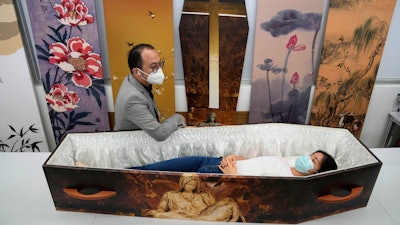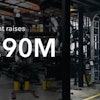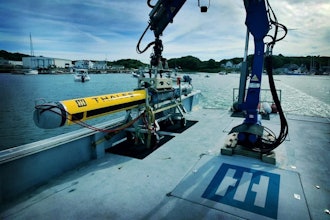
HONG KONG (AP) — Hong Kong’s deadliest coronavirus outbreak has cost about 6,000 lives this year – and the city is now running out of coffins.
Authorities have scrambled to order more, with the government saying 1,200 coffins had reached the city last week with more to come.
Space constraints make cremation a common burial practice in the densely populated island territory off the Chinese mainland, and the coffins typically are wood or wood substitutes.
To answer the shortage of them due to the COVID-19 toll, some companies are offering alternatives such as an environmentally friendly cardboard coffin.
LifeArt Asia has cardboard coffins made of recycled wood fiber that can be customized with designs on the exterior. In its factory in Aberdeen, a southern district of Hong Kong, up to 50 coffins can be produced a day.
CEO Wilson Tong said there is still some resistance to using caskets made of cardboard. “(People feel that) it’s a little bit shameful to use so-called paper caskets. They feel that this is not very respectful to their loved ones,” Tong said.
But he noted the company has designs that can reflect religion or hobbies and the coffin can even have a personalized color. "So it gives more than enough sufficient choices to the people, and so that they can customize the funeral and offer a more pleasant farewell without the fear of death.”
The company says its cardboard coffins, when burned during the cremation, emits 87% less greenhouse gas compared to those made of wood or wood substitutes. Each LifeArt coffin weights about 10.5 kilograms (23 pounds), and can carry a body that weights up to 200 kilograms (441 pounds).
Hong Kong has reported about 200 deaths daily on average over the past week as many elderly residents who were unvaccinated die from COVID-19. The surge has put a strain on mortuaries, and refrigerated containers are being used to temporarily store bodies.
Amid the rising toll, nonprofit Forget Thee Not, which advises people on their choices for last rites, bought 300 cardboard coffins and caskets to either send to hospitals or give to families who need them.
“We have been promoting environmental-friendly and personalized funerals. Now we see that Hong Kong needs more coffins. There are not enough coffins for the bodies in our hospitals,” said Albert Ko, a board director at Forget Thee Not.
Ko said some of the elderly who discussed their last rites with the organization have been open-minded and welcoming to the idea of eco-coffins.
“We hope to take this opportunity to contribute as well as promote eco-coffins,” he said.






















